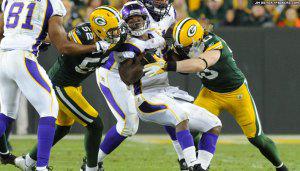 Monday Night Football’s game was a Green Bay Packers blowout over the Minnesota Vikings (45 – 7.) Like most of Packer Nation, I enjoyed watching the team do their jobs so expertly. It got me thinking: What if you were as good at your job as Aaron Rodgers and his teammates? You might be the defending Super Bowl champion of your profession. Here are some lessons you can take from the Green Bay Packers.
Monday Night Football’s game was a Green Bay Packers blowout over the Minnesota Vikings (45 – 7.) Like most of Packer Nation, I enjoyed watching the team do their jobs so expertly. It got me thinking: What if you were as good at your job as Aaron Rodgers and his teammates? You might be the defending Super Bowl champion of your profession. Here are some lessons you can take from the Green Bay Packers.
Lesson One: Run your routes with precision. There are times when Aaron Rodgers can take the ball, turn and fire it down the field to Donald Driver without actually looking to see if he’s there. Rodgers doesn’t need to look; he knows that it’s Driver’s job to be there. It’s his job to know the route, run it precisely, and catch the ball. Rodgers and Driver spend hundreds of hours practicing the routes and the throws; they know that it takes thousands of repetitions to get to the point where Rodgers can turn and throw with complete confidence. I’ve written about what it takes to become proficient; practice (not necessarily talent) is the difference between a good player and a great one.
Lesson Two: Identify and curtail bad behavior immediately – with no excuses. On the playing field, when a player makes a mistake or breaks a rule, the whistle blows. Often, the game is stopped altogether while impartial judges determine what happened and what the consequences should be. The entire team is penalized for bad behavior on the field; the individual is penalized for losing discipline or making mistakes such as false starts or stepping off the field. There are no exceptions, no mitigating circumstances, no excuses. I often wish we could consult the referee – or at least instant replay – in business meetings and on the job.
Lesson Three: Learn from your mistakes. No matter whether the play was a completed pass or a sack; the first thing Aaron Rodgers did during a time out was go to the sidelines to consult the coach about what he could have done better. He looked at the defense and his offense and made adjustments. We don’t often get that same kind of immediate feedback on our performance on the job. When we do, we’re seldom able to take the same objective approach to solving problems and correcting future strategy. But it’s how great players make corrections that win the game.
Lesson Four: Always have a Plan B. Sometimes, even a perfectly run route is not enough to shake a defender. Sometimes, the defense is as good as you are on offense. When Driver can’t get open enough to catch the ball, Rodgers must make a quick decision about the next best receiver – or decide to run the ball himself. He has only a split second to make the choice, and failure can be painful. Literally. We don’t make business and career decisions with 300-pound men running at us screaming (thank goodness) but that means we seldom think out our strategies very far in advance. Rodgers has the experience and the guts to make a fast call on his best strategy under duress. That’s in part because he’s visualized it hundreds of times before he ever sees it in the game. It’s also because he has trained himself to recognize opportunity when he sees it – and to act instantly. Can you say the same?
You may never get to the Super Bowl, heist the trophy, and have thousands of cheering fans screaming your name. But you can improve your performance on the job every day through hard work and practice. And I’ll be here on the sidelines, cheering for you.

